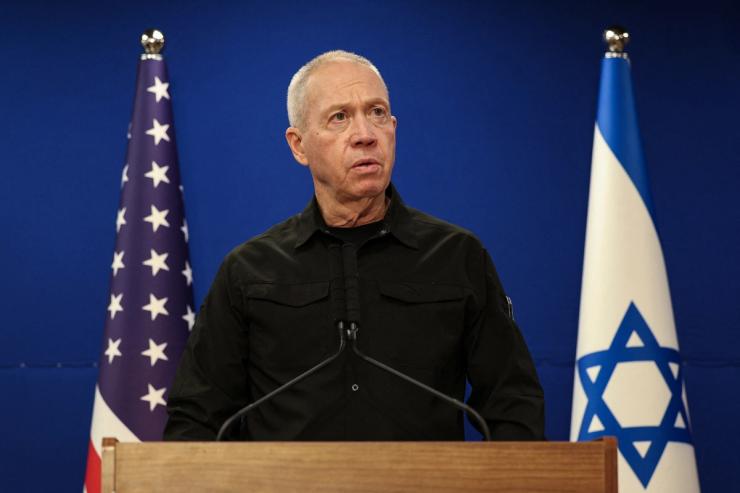The News
Palestinians will govern the Gaza Strip after the war, Israel’s defense minister Yoav Gallant said Monday, just hours after what Israeli authorities called a “multiple car-ramming” terror attack north of Tel Aviv left one person dead and several others injured.
“Palestinians live in Gaza and therefore Palestinians will govern it in the future,” Gallant said at a press conference. “The future Gaza government must grow out of the Gaza Strip.”
His comments came after the 100th day of the Israel-Hamas war. Gallant has previously said that Israel will not exercise control over Gaza, and that Palestinian players will be responsible for it.
Earlier on Monday, police arrested two suspects from the West Bank for allegedly stealing cars and running over pedestrians in the city of Ra’anana. It’s unclear if Hamas played a role in the attacks.
While attacks in Israel have been rare, the country remains on edge more than three months after the Oct. 7 Hamas attack sparked the war, with Hamas this weekend releasing chilling videos that appeared to threaten the lives of the remaining hostages.
SIGNALS
Israelis still determined to defeat Hamas, but unsure about future security
More than two thirds of Israelis believe the country must continue fighting Hamas and not acquiesce to the U.S. demands of scaling back the bombardment, according to an Israel Democracy Institute (IDI) poll conducted in late December. But respondents also showed a significant drop in confidence regarding the future of Israeli security and democracy. “A generic call for unity is not enough,” wrote IDI president Yohanan Plesner, explaining that Israel risks uncharted polarization after the war when factions can no longer unite behind a single security cause. He opined that the future of Israel is contingent on constitutional reforms that “diffuse” centralized power and “guarantee the rights of all Israelis.”
Not everyone thinks that prioritizing hostage release is in Israel’s security interest
Government officials remain adamant that freeing the hostages is their top priority, but “time is working against the IDF” as it wins tactical battles against Hamas, but fails to secure the release of more hostages 100 days into the war, according to Israeli newspaper Maariv. Experts told the paper that the delays in another hostage deal might be an ego issue of the “political-security elite” who see it as a “weakness” to ask allies like Egypt and Qatar for more help. But Israel Hayom columnist Nadav Sharga argued that prioritizing hostage retrieval “at any cost” risks Israel’s security because any such deal will inevitably mean the release of terrorists detained by Israel. In his view, the current framing of the hostage situation means that politicians see the lives of the hostages as more valuable than “our children and grandchildren.”
Netanyahu seen as ‘worst Jewish leader’ for prioritizing his own political future
“Netanyahu will go down in history as the worst Jewish leader ever” for failing to separate his own interests from that of his country’s, one former opposition politician told The New Yorker editor David Remnick. His profile of Netanyahu details how the Israeli leader prioritized his political survival throughout his last term, pushing forward far-right legislation to appease his coalition, while ignoring several security warnings that Hamas was eyeing Israel’s vulnerability amid its political instability and civil factions. Both leftist and conservative Israeli politicians are furious at Netanyahu, with former prime minister Naftali Bennett saying, “Israel has been tearing itself apart and its immune system became weak. Our enemy saw that and attacked.”



